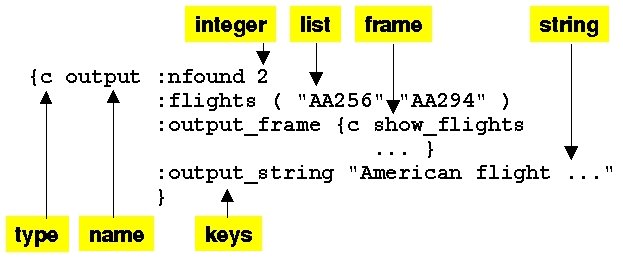| License / Documentation home / Help and feedback |
As we've already learned, the basic structure which is passed between server and Hub is called a frame. In this lesson, we'll learn how to manipulate frames, and also a little about how they're built.
Once you learn enough, you can consult the frame and object reference.


Here's a table of the properties of the four types we'll be discussing.
| Gal_ObjectType | C type | printed representation | comments |
| GAL_FRAME | Gal_Frame | {<type> <name> <key> <value> ... } | whitespace between opening bracket and type is forbidden; whitespace between elements (type, name, keys, values) is obligatory |
| GAL_STRING | (char *) | "foo" | whitespace in strings is preserved; escape character is backslash (\) |
| GAL_INT | 32 bit integer | 5 | explicit sign prefixes (+,-) also recognized |
| GAL_LIST | an array of Gal_Objects | ( <obj> <obj> <obj> ) | lists are heterogeneous (multiple object types can appear in a single list); whitespace between elements is obligatory |
/* Create the frame */Alternatively, you can use the function Gal_ReadFrameFromString to convert the string representation of a frame into a Gal_Frame structure:
Gal_Frame f = Gal_MakeFrame("output", GAL_CLAUSE);/* Do something with the frame */
...
/* Free the frame */
Gal_FreeFrame(f);
/* Create the frame */
Gal_Frame f = Gal_ReadFrameFromString("{c output }");/* Do something with the frame */
...
/* Free the frame */
Gal_FreeFrame(f);
| Gal_ObjectType | Creating a Gal_Object | Extracting the data from the Gal_Object |
| GAL_FRAME | Gal_FrameObject | Gal_FrameValue |
| GAL_STRING | Gal_StringObject | Gal_StringValue |
| GAL_INT | Gal_IntObject | Gal_IntValue |
| GAL_LIST | Gal_ListObject | Gal_ListValue |
All these objects can be freed using the function Gal_FreeObject. Here are some examples with frames, strings and integers:
Gal_Object frame_obj, string_obj, int_obj, list_obj;Memory management note. The rules of memory management for frames and objects is a little complicated, and we won't go into it here. The only point worth noting at this point is that for the set of functions we use here, when frames and objects are freed, all the frames and objects in them are freed. The full reference has complete details, as well as alternative functions which give you more control over memory management.
Gal_Object list_array[3];
Gal_Frame output_frame;
char *foo;
int five;
int list_length;
Gal_Object *list_contents;/* Create a frame and wrap an object around it */
frame_obj = Gal_FrameObject(Gal_ReadFrameFromString("{c output }"));/* Wrap an object around a string */
string_obj = Gal_StringObject("foo");/* Wrap an object around an integer */
int_obj = Gal_IntObject(5);/* Extract the frame from the object */
output_frame = Gal_FrameValue(frame_obj);/* Extract the string from the object */
foo = Gal_StringValue(string_obj);/* Extract the integer from the object */
five = Gal_IntValue(int_object);/* Populate the list array */
list_array[0] = frame_obj;
list_array[1] = string_obj;
list_array[3] = int_obj;/* Wrap a list around the array.
Printed representation of the list is( {c output } "foo" 5 )
*/
list_obj = Gal_ListObject(list_array, 3);/* Extract the list from the object. The list_length integer will
contain the length of the list (i.e., 3) */
list_contents = Gal_ListValue(list_array, &list_length);/* Free the list object. See the memory management note. */
Gal_FreeObject(list_obj);
Gal_Object string_obj;To extract the data from the frames directly, there's a set of shorthand functions that we frequently use. These functions find the appropriate key-value pair and check to see that the value is of the appropriate type:
char *string;
/* Create the frame */
Gal_Frame f = Gal_MakeFrame("output", GAL_CLAUSE);/* Add a string. Printed representation of the frame is now
{c output :output_string "hello" }
*/
Gal_SetProp(f, ":output_string", Gal_StringObject("hello"));/* Extract the string object. */
string_obj = Gal_GetObject(f, ":output_string");
string = Gal_StringValue(string_obj);
| Gal_ObjectType | Extracting the data from the frame |
| GAL_FRAME | Gal_GetFrame |
| GAL_STRING | Gal_GetString |
| GAL_INT | Gal_GetInt |
| GAL_LIST | Gal_GetList |
So the example above could be rewritten as follows:
char *string;Lists and integers have some special properties. For integers, the problem is that all these functions return NULL when they don't find the appropriate key-value pair. This is a problem for Gal_GetInt, because NULL is equivalent in C to 0; as a result, Gal_GetInt can't distinguish between a value of 0 and the absence of a key. So we recommend using Gal_GetObject followed by Gal_IntValue if the distinction is important to you.
/* Create the frame */
Gal_Frame f = Gal_MakeFrame("output", GAL_CLAUSE);/* Add a string. Printed representation of the frame is now
{c output :output_string "hello" }
*/
Gal_SetProp(f, ":output_string", Gal_StringObject("hello"));/* Extract the string object. */
string = Gal_GetString(f, ":output_string");
For lists, there is an additional function Gal_GetListObject which extracts the nth element of a list in a key-value pair:
Gal_Frame f = Gal_ReadFrameFromString("{c listframe :list ( 5 6 7 ) }");
Gal_Object int_obj;/* int_obj will be a Gal_Object wrapped around the integer 7 */
int_obj = Gal_GetListObject(f, ":list", 2);
Next: Server basics
| License / Documentation home / Help and feedback |